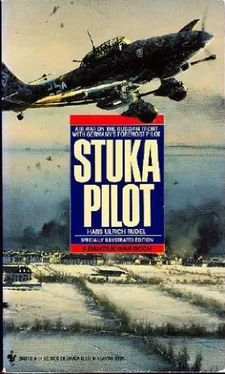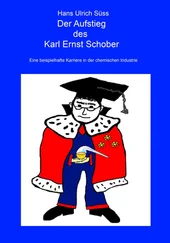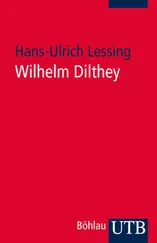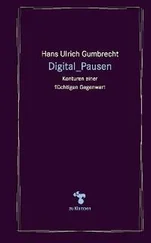His mother: MARTHA RUDEL.
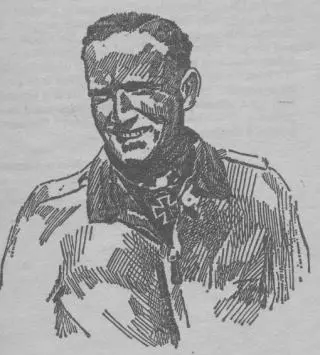
Hans-Ulrich Rudel
1. FROM UMBRELLA TO DIVE BOMBER
“Only he is lost who gives himself up for lost!”
1924. My home is the rectory of the little village of Seiferdau in Silesia; I am eight. One Sunday my father and mother go into the neighboring town of Schweidnitz for an “Aviation Day.” I am furious that I am not allowed to go with them, and when they return my parents have to tell me over and over again what they have seen there. And so I hear about a man who jumped from a great height with a parachute and came safely down to earth. This delights me, and I badger my sisters for an exact description of the man and the parachute. Mother sews me a little model, I attach a stone to it and am proud when stone and parachute slowly drift to the ground. I think to myself that what a stone can do I must be able to do too, and when I am left alone for a couple of hours the following Sunday I lose no time in exploiting my new discovery.
Upstairs to the first floor! I climb on to the window sill with an umbrella, open it up, take a quick look down, and before I have time to be afraid I jump. I land on a soft flower-bed and am surprised to find that I have twisted every muscle and actually broken a leg. In the tricky way in which umbrellas are apt to behave, the thing has turned inside out and hardly braked my fall. But nevertheless I abide by my resolve: I will be an airman.
After a brief flirtation with modem languages at the local school I take up classics, and learn Greek and Latin. At Sagen, Niesky, Görlitz and Lauban—my father is moved to these different parishes in the lovely province of Silesia—my schooling is completed. My holidays are devoted almost exclusively to sport, including motor-cycling; athletics in summer, and skiing in winter lay the foundations of a robust constitution for later life. I enjoy everything; so I do not specialize in any particular field. Our little village does not offer very much scope—my knowledge of sporting tackle is derived solely from magazines—so I practice pole-jumping by using a long tree-prop to vault over my mother’s clothesline. Thus later with a proper bamboo pole I can clear a respectable height… As a ten year old I go off into the Eulengebirge, twenty three miles away, with the six foot long skis given to me as a Christmas present, and teach myself skiing… I stand a couple of planks resting on a sawing-horse of my father’s, this gives me an upward slope. I give the contraption the once—over to make sure it is firmly fixed. No flunking now—I open the throttle of my motorbike and sail up the boards… and over. I land on the other side, swerve wildly and back again for another run at the planks and the trusty sawing-horse! It never enters my head that in addition to all this I ought to be a good scholar, much to my parents’ distress: I play almost every conceivable prank on my teachers. But the question of my future becomes a more serious problem as matriculation looms nearer. One of my sisters is studying medicine, and consequently the possibility of finding the large sum of money needed to have me trained as a civil air-pilot does not even come under consideration—a pity. So I decide to become a sports instructor.
Quite unexpectedly the Luftwaffe is created, and with it a demand for applicants for a reserve of officers.
Black sheep that I am, I see little hope of passing the difficult entrance examination. Several fellows I know, rather older than myself, who have previously tried to get in have been unlucky. Apparently only sixty out of six hundred candidates will be selected, and I cannot imagine any likelihood of my being among this ten per cent. Fate, however, disposes otherwise; and in August 1936 I have in my pocket the notification of my admission to the Military School at Wildpark-Werder for next December. Two months Labour Service work on the regulation of the Neisse at Muskau follow matriculation in the autumn. In the first term at Wildpark-Werder we recruits are put through the mill. Our infantry training is completed in six months.
Aircraft we see only from the ground, with an especial longing when we happen to be flat on our faces. The rule of no smoking and no drinking, the virtual restriction of all leisure time to physical exercise and games, the pretence of indifference to the distractions of the near-by capital, are tiresome. I take a rather dim view of my milk-drinking existence, and that is putting it mildly. I earn no black marks in my military and athletic training and so my supervisional officer, Lt. Feldmann, is not dissatisfied. In some respects, however, I am not altogether successful in living down the reputation of being a “queer fish.”
The second term finds us in the neighboring town of Werder, a holiday resort in the Havel lake district. At last we are taught to fly. Competent instructors are at pains to initiate us into the mysteries of aviation. We practice circuits and landings with Fit. Sgt. Dieselhorst. After about the sixtieth time I am able to undertake a solo flight, and this achievement makes me an average pupil of my class. In conjunction with our flying lessons the technical and military curriculum is continued, as well as an advanced course for a commission. Our flying training finishes at the end of this second term and we receive our flight authority. The third term, back at Wildpark, is no longer so diversified. Little stress is laid on flying; instead air tactics, ground tactics, defense methods and other special subjects figure more largely in our work. Meanwhile I am seconded for a short spell and sent to Giebelstadt near Würzburg, the lovely old city on the Main, where I am attached to a combat unit as officer cadet. Gradually the date of our passing-out examination draws near, and speculation is rife as to what unit and what branch of the service we shall eventually be posted to. Almost to a man we would like to be fighter pilots, but this is clearly impossible. There is a rumor going about that our whole class is to be assigned to Bomber Command. Promotion to the rank of officer senior cadet and posting to a definite formation follows for those who pass the difficult examination.
Shortly before leaving the Military School we are sent on a visit to an anti-aircraft gunnery school on the Baltic coast. Quite unexpectedly Goering arrives and addresses us. At the end of his speech he asks for dive bomber volunteers. He tells us he still requires a number of young officers for the newly-formed Stuka formations. It does not take me long to make up my mind. “You would like to become a fighter,” I argue, “but you will have to be a bomber; so you might as well volunteer for the Stukas and be done with it.”
In any case I do not fancy myself flying the heavy bomber aircraft. A little quick thinking and my name is entered on the list of Stuka candidates. A few days later we all get our postings. Almost the whole of the class is assigned—to Fighter Command! I am bitterly disappointed, but there is nothing to be done about it.
I am a Stuka pilot. And so I watch my comrades happily depart.
In June 1938 I arrive at Graz, in the picturesque province of Steiermark, to report to a Stuka formation as officer senior cadet. It is three months since German troops marched into Austria, and the population is enthusiastic. The squadron which is stationed outside the town in the village of Thalerhof has recently received the type 87 Junkers; the single-seater Henschel will no longer be used as a dive-bomber. Learning to dive at all angles up to ninety degrees, formation flying, aerial gunnery and bombing are the fundamentals of the new arm. We are soon familiar with it. It cannot be said that I am a rapid learner; furthermore the rest of the squadron have already passed all their tests when I join it. It takes a long time to ring the bell, too long to please my squadron leader. I catch on so slowly that he ceases to believe that it will ever ring at all.
Читать дальше
